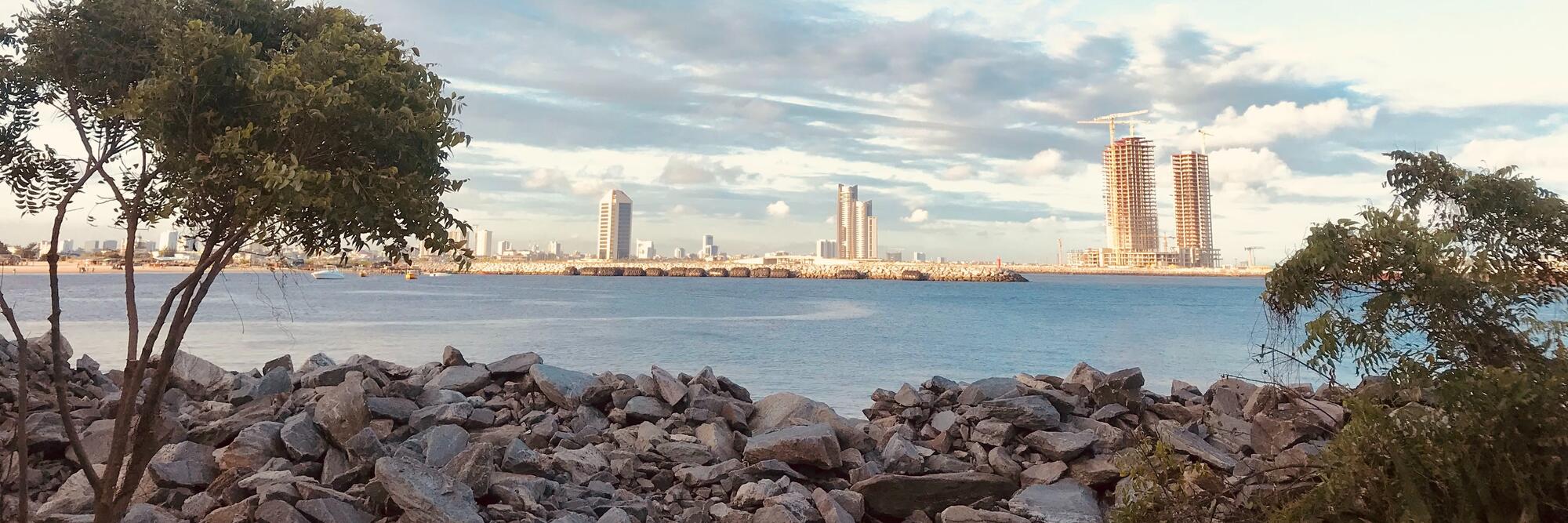Clementine Wallop is a British expat who lived with her husband in Singapore before moving out to Nigeria in 2014. Both journalists, they decided to relocate to the city of Abuja to add variety to their lives and Clementine now works as a freelance writer and consultant and says she’s enjoying getting to knowing the friendly people in her new home.
To learn more about the country, have a look at our guide to Nigeria, or read more expat experiences in Nigeria.
About Clementine
Q: Where are you originally from?
A: Britain
Q: Where are you living now?
A: Abuja, Nigeria
Q: When did you move here?
A: May 2014
Q: Did you move here alone or with family?
A: With my husband
Q: Why did you move?
A: We moved because we wanted a change from our previous posting in Singapore. While we loved Singapore, our jobs as journalists weren’t offering enough variety, and we wanted that element of the unexpected back in our lives. My husband found a job here with a news agency, and I went freelance.
Living in Nigeria
Q: What do you enjoy most about Abuja? How would you rate the quality of life compared to your home country?
A: Nigerians are funny, kind and interesting people; it’s a cliché, but there is never a dull moment. Abuja also has gorgeous flowers and birds, and its geographical situation is very pretty: lots of green, with dramatic rocks popping up here and there. It’s impossible to compare the quality of life with London because the cities are so different. They’re both expensive, but that’s where it ends. On the one hand, we have fewer restaurants and shows to go to; on the other, we have a driver and car here, which we wouldn’t have at home.
Q: Any negatives? What do you miss most about home?
A: Getting a visa to live here is incredibly hard – it took me 20 months to get a multi-entry resident permit – and Abuja isn’t especially pedestrian-friendly, which makes it harder to get to know. Food is hugely important to me, so there’s a long list of things I can’t get and really miss, fresh seafood in particular. The Boko Haram insurgency and occasional bombings/bomb threats in Abuja aren’t unimportant, but these are relatively rare occurrences: most days here are quiet and peaceful.
Q: What are the biggest adjustments you had to make when settling into expat life in Nigeria?
A: Going freelance and working from home meant a lot of people assuming I don’t work at all and labelling me a trailing spouse, which is a huge international sore point, as many of you will know. I am very open-minded, quite patient and had worked extensively across Africa before, so things like bad traffic or power cuts weren’t too difficult to adjust to.
Q: What’s the cost of living compared to home?
A: Abuja is an extremely expensive city, easily comparable to Singapore, London, or even Hong Kong. Property, food, utilities and internet access are all expensive; local mobile phones, local beer, street taxis and cigarettes are cheap.
Q: How would you rate the public transport?
A: There is no public transport as many people would recognise it – there are no underground trains or trams. There are minibuses and a limited local bus service that is improving. Street cabs are easy to find and cheap, but the cars themselves are of questionable vintage and roadworthiness. If possible, you should have a car.
Q: How would you rate the healthcare in Abuja?
A: I try my hardest not to get ill here and bring large amounts of medicine with me from Britain. Our healthcare provider suggests The Abuja Clinic. Please note all payments are upfront, and you should expect to queue to pay and then queue again to see a doctor.
Q: What are the biggest safety issues facing expats living in Nigeria?
A: Any foreign service guidance will warn against travel to various parts of Nigeria and warn of the terrorist threat and the kidnap threat in Abuja for foreign nationals. Robbery is also a problem. However, this isn’t representative of the fact that with a little good sense, there’s no reason to be fearful of living in Abuja. I feel safe walking around, and I take street cabs by myself during the day. The vast majority of days I have spent here, I have felt safe and welcome. Avoid large groups of angry people, don’t walk alone at night in parts of the city you don’t know, and don’t flash large amounts of cash: the same rules you’d apply in any unknown city.
Q: How do you rate the standard of housing in Abuja?
A: Many companies offer their employees accommodation on designated compounds. Those that don’t usually live in flats or houses on smaller compounds. Because Abuja rents are paid two years upfront, it’s up to the landlord whether he chooses to maintain your house well or badly. Private rentals for expats should include a generator and borehole; ensure you have these and will have 24-hour access to power before signing a contract.
Q: Any areas you’d recommend for expats to live in?
A: Wuse II, Asokoro, and Maitama are all very nice, with easy access to supermarkets, restaurants, bars and hotels.
Meeting people and making friends
Q: How tolerant are the locals of foreigners? Is there any obvious discrimination against particular religions or women, etc.?
A: I can only speak as a white British woman, but Nigerians are very welcoming and extremely tolerant. There have been moments where people have assumed my husband is ‘the head of the household’ and spoken to him about a problem rather than to me, but otherwise, I haven’t felt any discrimination whatsoever. Because Nigeria is a highly religious country (roughly 50:50 Christian and Muslim), being a practising church- or mosque-goer can help you assimilate.
Q: Was it easy meeting people and making friends?
A: Yes, it was easy. We had some introductions from friends elsewhere in West Africa, from Singapore and from London, and we just went with those.
Q: Have you made friends with locals, or do you mix mainly with other expats?
A: Our friends are a mixed bunch. New expats can benefit from getting out of the compound, not being scared or worried, and just being open to any and all conversations. InterNations is active here, and the Ladies International Social Club of Abuja (LISCOA) is a welcoming group.
Working in Nigeria
Q: Did you have a problem getting a visa or work permit? Did you tackle the visa process yourself, or did you enlist the services of an immigration consultant?
A: Yes, it was extremely difficult for us both to get visas, and we used immigration lawyers.
Q: What’s the economic climate like in Abuja? Do you have any tips for expats looking to find a job there?
A: The economic climate is suffering from the lower oil price; oil is Nigeria’s largest export. Expats tend not to arrive without a job, but the sectors active here are oil, media, development and infrastructure.
Q: How does the work culture differ from home
A: Nigerian work culture runs a lot on chat and face-to-face meetings. Telecoms and email are unreliable, so it’s best to meet in person. Nigerians are exceptionally entrepreneurial, so don’t be surprised to go to a meeting to discuss one thing and find yourself discussing something entirely different by the end of it.
Family and children
Q: Did your spouse or partner have problems adjusting to their new home? Do you think there are any specific challenges for a trailing spouse?
A: Unless you’re working for a diplomatic mission, it can be very difficult to get a spouse visa, especially for unmarried couples. I would go as far as to say unmarried couples where half of the couple is self-employed/freelance/location-independent should not move to Nigeria, full stop. It’s sad but true.
And finally…
Q: Is there any other advice you would like to offer new expat arrivals?
A: The main thing is to look beyond the headline projection of Nigeria and do all you can to learn about it. Abuja may be labelled a hostile environment posting, but it’s friendly, fun and unlike anywhere else you can live. A good book to read is Looking for Transwonderland by Noo Saro-Wiwa, which is a travelogue from Nigeria. If you can, learn a few words of pidgin; that’s also very helpful. And when people say, “What do you have for me?” (i.e. please give me a bribe), you can most times just say, “A smile and my thanks,” and they’ll return the same.
– Interviewed in June 2015



